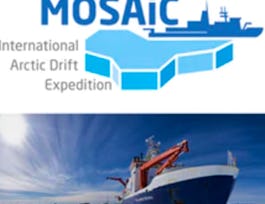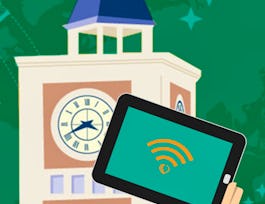Our Earth’s Future is about the science of climate change and how to talk about it. You will learn from scientists in the fields of climatology, oceanography, Earth science, and anthropology who study how climate change is affecting people, populations, and ways of life. Explore the multiple lines of evidence for the human-induced climate change that is happening today, and consider what that means for the future of our planet. At the end of this course you will be able to understand key scientific principles, identify and address misconceptions, and contribute confidently to conversations about climate change.


Our Earth's Future
Taught in English
Some content may not be translated
36,581 already enrolled
(772 reviews)
Details to know

Add to your LinkedIn profile
5 quizzes
See how employees at top companies are mastering in-demand skills


Earn a career certificate
Add this credential to your LinkedIn profile, resume, or CV
Share it on social media and in your performance review

There are 5 modules in this course
Human-induced climate change is happening. But in order to explore the evidence for this claim, we must first ask two questions: “What is science?” and “What is climate?” Once we understand how science is done and the basic dynamics of the climate system, we’ll focus on how scientists study ice cores, and see how evidence of climate change in the past is fundamental to understanding what lies ahead.
What's included
4 videos4 readings1 quiz
Both the ocean’s sheer size – it covers seventy percent of our planet’s surface – and the properties of water make the ocean a major player in Earth’s climate system. An enormous reservoir of heat, the ocean is an important mechanism of heat storage and exchange with the atmosphere, which has important implications for climate change. We’ll focus on one of the consequences of warming: melting of the Greenland and Antarctic ice sheets. How might this melting lead to future sea level rise? Scientists are studying geological records of past warming, and associated sea level rise, to see what the future may bring.
What's included
4 videos1 reading1 quiz
An important counterpart to observational evidence is computer modeling, an essential tool for investigating how the climate system works and how it will respond to continued greenhouse gas buildup in the atmosphere. How do we know that a model is accurate? One way is to consider a past event, enter the historic climate data, and see if the model successfully “hindcasts” the event in reasonable detail. Ever more detailed, today’s supercomputer models can even help identify the potential causes of climate events on a regional scale, as climatologist Dr. Michela Biasutti explains using her research on droughts in sub-Saharan Africa.
What's included
3 videos2 readings1 quiz
Climate change is often framed as a future phenomenon, but it’s clear that people are already experiencing the consequences. What are the effects? It depends to some extent on where, and how, you live. For example, in the Pacific Islands, where sea level rise is threatening entire ways of life, communities have come together to prepare. What happens when there’s no place to go? Coastal communities aren’t the only ones at risk; food insecurity may one day threaten us all. And of course, humans are not the only species affected, and some will be at even greater risk in the future.
What's included
5 videos2 readings1 quiz
What happens next? We don’t know, but the answer depends far less on scientific data than on human action—or inaction. The major uncertainty is the future rate of greenhouse gas emissions, which is impossible to predict because it depends on socioeconomic, technological, and political developments. Furthermore, the risks posed by different kinds of natural phenomena vary widely, and similar events can have very different consequences depending on where and even when they occur. How will the effects be distributed, and how resilient are we? Hurricane Sandy provided lessons about our willingness to accept and plan for a future where severe climate events happen more frequently.
What's included
3 videos6 readings1 quiz
Instructor

Offered by
Recommended if you're interested in Environmental Science and Sustainability

University of Colorado Boulder

Dartmouth College

Coursera Project Network

Universidad Austral
Why people choose Coursera for their career




Learner reviews
Showing 3 of 772
772 reviews
- 5 stars
74.64%
- 4 stars
20.56%
- 3 stars
3.23%
- 2 stars
1.03%
- 1 star
0.51%

Open new doors with Coursera Plus
Unlimited access to 7,000+ world-class courses, hands-on projects, and job-ready certificate programs - all included in your subscription
Advance your career with an online degree
Earn a degree from world-class universities - 100% online
Join over 3,400 global companies that choose Coursera for Business
Upskill your employees to excel in the digital economy
Frequently asked questions
Access to lectures and assignments depends on your type of enrollment. If you take a course in audit mode, you will be able to see most course materials for free. To access graded assignments and to earn a Certificate, you will need to purchase the Certificate experience, during or after your audit. If you don't see the audit option:
The course may not offer an audit option. You can try a Free Trial instead, or apply for Financial Aid.
The course may offer 'Full Course, No Certificate' instead. This option lets you see all course materials, submit required assessments, and get a final grade. This also means that you will not be able to purchase a Certificate experience.
When you purchase a Certificate you get access to all course materials, including graded assignments. Upon completing the course, your electronic Certificate will be added to your Accomplishments page - from there, you can print your Certificate or add it to your LinkedIn profile. If you only want to read and view the course content, you can audit the course for free.
You will be eligible for a full refund until two weeks after your payment date, or (for courses that have just launched) until two weeks after the first session of the course begins, whichever is later. You cannot receive a refund once you’ve earned a Course Certificate, even if you complete the course within the two-week refund period. See our full refund policy.


